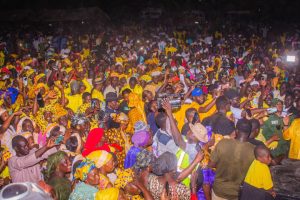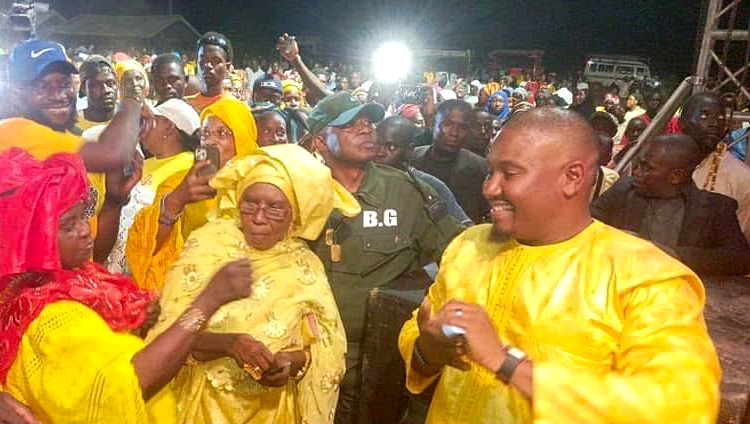Gambiaj.com – (KUNTAUR, The Gambia) – In the heart of Central River Region (CRR) North, Talib Ahmed Bensouda, the charismatic Mayor of Kanifing and rising figure within the United Democratic Party (UDP), staged a politically charged and deeply symbolic rally aimed at projecting unity and generational continuity within a party currently grappling with internal fractures.
Dubbed “Talib Ahmad Bensouda la ding kuliyo” – literally meaning “Baptizing Talib Bensouda’s children” – the rally was more than a show of grassroots mobilization.
It was a strategic political performance staged in Kuntaur Fula Kunda, a town steeped in personal and national symbolism for Bensouda, to reaffirm loyalty to UDP’s founding ideals and its veteran leader Ousainou Darboe, while subtly laying claim to a political legacy of his own.
From Ballanghar to Lamin Koto, UDP “Compins” and “Kaffoos” converged in large numbers to cheer their “political father,” chanting slogans like “No retreat, no surrender.”
The theatrics served not only to energize the base but also to position Talib as a unifying figure amid simmering factionalism within the UDP – a party that has in recent months shown signs of internal strain over generational change, strategic direction, and political entitlement.
A Rally Laced with Sentiment and Strategy
“This rally was my first in the home of my grandfather, Sir Dawda Kairaba Jawara,” Talib noted on Facebook, anchoring his political identity in the legacy of The Gambia’s first president.
That personal history was deployed to suggest not only belonging but also leadership pedigree woven through names like Seedy Omar Bensouda, Talib Bensouda (MP Niani), and Alkalo Ahmed Bensouda.

But beneath the nostalgia was a clear strategic objective: reclaim the moral and emotional leadership of the UDP’s fragmented base by reminding supporters of both his lineage and his loyalty.
His message was unmistakable: “We remain loyal to [Ousainou Darboe] and will support him because he is a good man… who loves the youths of this country.”
This declaration was not only a personal vow but a political olive branch at a time when segments within the UDP are reportedly disillusioned with both the old guard and the perceived ambitions of younger leaders.
A Party of Hope Amid Division and Calls for Unity
In recent months, UDP has faced allegations of internal sectarianism, accusations of tribal politicking, and disagreements over generational succession.
Reports of rivalry between UDP youth cohorts and the elders – as well as between urban and rural branches – have raised concerns over the party’s preparedness for the 2026 elections.
Talib’s rally directly tackled these fissures. “Do not let anyone divide you. The Fulas, Mandinkas, Jolas, and Wolofs have always lived together peacefully,” he warned. “Don’t let anyone tell you that someone from this, or another tribe, cannot lead The Gambia.”
This appeal for unity was unmistakably aimed at critics within and outside the UDP who have accused some factions of using ethnic identity as a political wedge — a tactic that has marred Gambian politics since the First Republic.
Talib did not spare the Barrow administration in his critique, citing the economic hardship facing Gambians: soaring bread and cement prices, CFA exchange rate burdens, growing insecurity in the Kombos, and water scarcity in CRR North.
These grievances serve as fuel for the UDP’s opposition platform — but they also underscore the stakes for a party in disarray.
“Gambians have high hopes for UDP,” he said, before urging militants to abandon “petty talks” and focus on winning power.
The line seemed to address not just ordinary supporters but also figures within the UDP’s national executive, some of whom are reportedly uneasy with the ascendancy of younger, media-savvy politicians like Bensouda.
His remarks mirrored Darboe’s own repeated calls for discipline and focus within the ranks, but they also came across as a subtle rebuke of those within the party more focused on internal squabbles than national strategy.
Beyond Darboe: A Prelude to Succession
While Bensouda went to great lengths to express his loyalty to Darboe, who has renewed his ambition to run for the 2026 presidential election, many observers believe the rally was also a soft launch of his broader political ambition.
His reference to being the “political father” to a new generation of militants and the emphasis on family legacy suggest a calculated effort to consolidate authority among UDP’s youthful base – especially in regions that have traditionally leaned toward the party but feel neglected.
By invoking both Jawara and Darboe, Bensouda is crafting a hybrid political identity: grounded in national history, endorsed by UDP orthodoxy, and propelled by a new vision.
Whether the Kuntaur rally will heal or heighten the growing cracks within the UDP remains to be seen.
But what is clear is that Talib Bensouda has emerged as a pivotal player in the unfolding drama of the party’s future.
By calling for unity, decrying tribalism, and projecting steadfast loyalty to Darboe, Bensouda walked a careful line – attempting to straddle the role of loyal lieutenant and heir apparent. In doing so, he positioned himself not just as a mayor, but as a national figure ready to lead a movement that remains, for now, caught between legacy and transformation.










